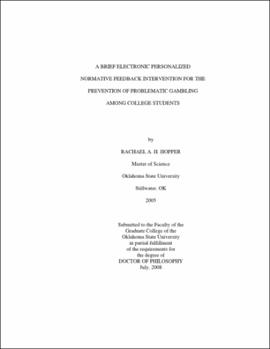| dc.contributor.advisor | Leffingwell, Thad Ryan | |
| dc.contributor.author | Hopper, Rachael Ann Horton | |
| dc.date.accessioned | 2013-11-26T08:27:40Z | |
| dc.date.available | 2013-11-26T08:27:40Z | |
| dc.date.issued | 2008-07 | |
| dc.identifier.uri | https://hdl.handle.net/11244/6948 | |
| dc.description.abstract | Scope and Method of Study: The purpose of this study was to examine relationships between perceived norms and high risk gambling behaviors among college students. Participants in the study were 68 undergraduate students at Oklahoma State University. Students whose gambling behavior was considered problematic based on responses to a screener were invited for participation in the study. Participants completed an online questionnaire designed to assess individual gambling behavior and perceptions of other's gambling behavior at three time points: baseline, one month follow-up, and three month follow-up. Participants in the experimental group were provided with personalized normative electronic feedback regarding how their gambling behaviors compared with other students at Oklahoma State University. Due to high attrition rates, only analyses of data from time points one and two were included in the study. | |
| dc.description.abstract | Findings and Conclusions: No significant differences were found across time between the experimental group and control group for quantity, peak quantity, or frequency of gambling. This suggests the normative intervention was unsuccessful at altering the problematic gambling behavior of its participants. Similarly, contrary to the hypothesis, no advances in readiness to change gambling behavior were seen in either the control or experimental group. However, there was a significant change in the normative perceptions of participants in the experimental group. It is understood that participants' often alter their own behavior to be more in-line with their perceptions of others' behavior. Therefore, although actual behavior change was not demonstrated in this study, changes in normative perceptions to become more accurate are promising. | |
| dc.format | application/pdf | |
| dc.language | en_US | |
| dc.rights | Copyright is held by the author who has granted the Oklahoma State University Library the non-exclusive right to share this material in its institutional repository. Contact Digital Library Services at lib-dls@okstate.edu or 405-744-9161 for the permission policy on the use, reproduction or distribution of this material. | |
| dc.title | Brief electronic personalized normative feedback intervention for the prevention of problematic gambling among college students | |
| dc.contributor.committeeMember | Grice, James W. | |
| dc.contributor.committeeMember | Chaney, John M. | |
| dc.contributor.committeeMember | Brown, Tom J. | |
| dc.contributor.committeeMember | Thrasher, Ronald R. | |
| osu.filename | Hopper_okstate_0664D_2787 | |
| osu.accesstype | Open Access | |
| dc.type.genre | Dissertation | |
| dc.type.material | Text | |
| dc.subject.keywords | gambling | |
| dc.subject.keywords | norms | |
| dc.subject.keywords | college | |
| dc.subject.keywords | brief intervention | |
| dc.subject.keywords | personalized | |
| dc.subject.keywords | feedback | |
| thesis.degree.discipline | Psychology | |
| thesis.degree.grantor | Oklahoma State University | |
